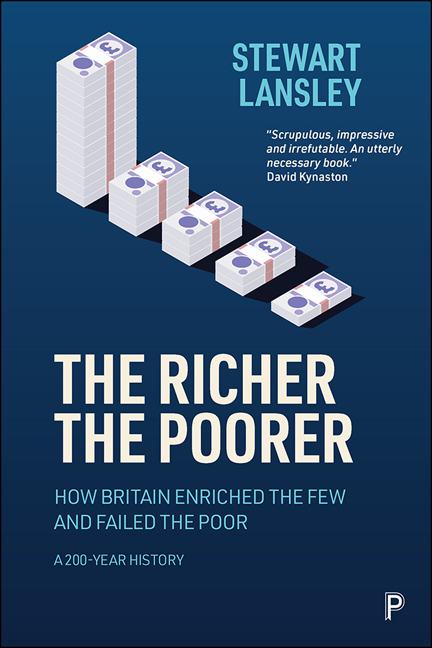Book contents
- Frontmatter
- Miscellaneous Frontmatter
- Dedication
- Epigraph
- Contents
- List of figures
- Preface and acknowledgements
- Introduction: Knighthoods for the rich, penalties for the poor
- PART I 1800–1939
- PART II 1940–59
- PART III 1960–79
- PART IV 1980–96
- PART V 1997–2010
- PART VI 2011–20
- Afterword: COVID-19 and ‘the polo season’
- Notes
- Index
- Frontmatter
- Miscellaneous Frontmatter
- Dedication
- Epigraph
- Contents
- List of figures
- Preface and acknowledgements
- Introduction: Knighthoods for the rich, penalties for the poor
- PART I 1800–1939
- PART II 1940–59
- PART III 1960–79
- PART IV 1980–96
- PART V 1997–2010
- PART VI 2011–20
- Afterword: COVID-19 and ‘the polo season’
- Notes
- Index
Summary
Eventually the distribution question was to return to the political agenda. “Inequality is emerging after a half-century in the wilderness”, declared Andrew Haldane, the Bank of England's chief economist, in 2014. The groundwork for this renewal of interest had been laid earlier. Official statistics suggested that the rise of inequality that began in the 1980s had levelled off during the 1990s, evidence that was in conflict with the persistence of runaway rewards at the top. This data, drawn from government surveys, was good at showing the gap across the broad range of incomes, between, for example, the income of a bus driver and a surgeon, but poor at capturing the tails of the distribution where the starkest changes had been occurring.
From the late 1990s, three leading scholars of inequality –the Oxfordbased economist Sir Tony Atkinson and his younger colleagues, Thomas Piketty of the Paris School of Economics and Emmanuel Saez of the University of California, Berkeley –embarked on detailed research into the long-run trend in top income shares. Painstakingly extracted from a new source –national tax archives –these studies were to have profound consequences for the inequality debate.
This pioneering work revealed that from the end of the First World War, the share of total income taken by the top 1 per cent in the UK had fallen continuously until the late 1970s, from a high of 19 per cent in 1918 to a low of 5.7 per cent in 1978. From then, the trend went into reverse, with the share reaching 15.4 per cent in 2009, leaving the rest of society, collectively, to manage on a much smaller share. These new data sets –for a range of countries –tracked the concentration of income at the top deep into the past. They confirmed that the big story of inequality had been the stark nature of the changes at the upper extreme of the income ladder. ‘The result has been a revolution in our understanding of long-term trends in inequality’, wrote Paul Krugman. ‘Before this revolution, most discussions of economic disparity more or less ignored the very rich.’
That a rich elite was able to acquire a share of national income approaching that enjoyed by their counterparts a century earlier was all the more striking for the way these rising shares were occurring in much more mature democracies and regulated economies.
- Type
- Chapter
- Information
- The Richer, the PoorerHow Britain Enriched the Few and Failed the Poor: A 200-Year History, pp. 188 - 197Publisher: Bristol University PressPrint publication year: 2021



